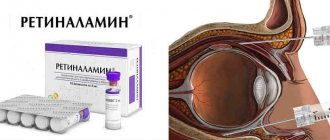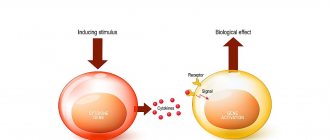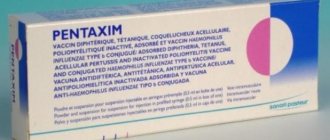Home / Articles by leading experts on the drug Allokin-Alfa / Articles by leading specialists on the drug Allokin-Alpha
The influence of staged prevention of intrauterine infection on the health of children born to mothers with recurrent herpetic infection
Authors: Ovchinnikova Marina Alekseevna
A combined method of managing patients with laryngeal panillomatosis in combination of surgical and conservative treatment
Authors: Volkova Karina Borisovna
The influence of qualitative characteristics of the endometrium on the effectiveness of IVF in women with tubo-peritoneal infertility
Authors: Vasyukhina Anna Aleksandrovna
Cervical cancer in Karelia: epidemiological, clinical, immunological and preventive aspects
Authors: Kovchur Pavel Ivanovich
Expression of early response genes and caspase genes as a possible diagnostic marker in the development of cervical cancer
Authors: Kurmyshkina Olga Vadimovna
Clinical and pathogenetic significance of tissue acidosis in patients with herpes simplex during different periods of the disease and optimization of anti-relapse measures
Authors: Ryazanova Olga Arturovna
Clinical and molecular genetic basis of precancer and early forms of cervical cancer
Authors: Korolenkova Lyubov Ivanovna
The use of allokin-alpha in the complex treatment of papillomavirus lesions of the cervix in women of reproductive age
Authors: Komissarova Olga Nikolaevna
Clinical, pathogenetic and prognostic significance of changes in the immune status and antioxidant system in patients with herpes and HIV infection
Authors: Azovtseva Olga Vladimirovna
Guide for doctors “Use of Allokin-alpha in the treatment of viral infections”
Authors: F.I. Ershov, V.A. Isakov, G.P. Becker, M.Yu. Serebryakov, T.V. Sologub, N.B. Serebryannaya, M.S. Tishchenko, S.I. Chernysh, 2008
Human papillomavirus
Features of conservative immunoantiviral therapy for patients with HPV-associated cervical intraepithelial neoplasia of I degree
Authors: O. E. Epifanova, O. P. Vinogradova, N. A. Andreeva
Efficiency of therapy for genital diseases with a combination of papillomavirus and herpesvirus infections
Authors: prof., doctor of medical sciences Rogovskaya S.I., Ph.D. Bebneva T.N., prof., doctor of medical sciences Polonskaya N.Yu. and etc.
New possibilities for the treatment of human papillomavirus infection
Authors: Perlamutrov Yu.N., Chernova N.I.
Experience of using Allokin-Alpha in the treatment of HPV-associated diseases
Authors: prof. Doctor of Medical Sciences Prilepskaya V.N., senior researcher Ph.D. Dovletkhanova E.R., Ph.D. Abakarova P.R., prof. Doctor of Medical Sciences Mezhevitinova E.A.
Reduction of viral load determined by the hybrid capture method (HC2 DNA HPV HR) in patients with severe intraepithelial neoplasia of the cervix as a result of effective pre-excision therapy with Allokin-Alpha
Authors: Doctor of Medical Sciences, Professor oncogynecologist Korolenkova L.I.
"Preconception preparation in patients with viral infections"
Authors: Sosnova E.A.
Clinical effectiveness of Allokin-Alfa and its effect on the expression of T-reg regulatory lymphocyte markers in the treatment of patients with chronic human papillomavirus infection
Authors: Kovchur P.I., Oleinik E.K., Bakhlaev I.E., Churov A.V., Oleinik V.M.
Reduction of the viral load of Hybrid Capture 2 as a result of effective pre-excision therapy with Allokin-alpha in patients with CIN 2-3/preinvasive cervical cancer
Authors: Korolenkova L.I., Bryuzgin V.V.
"Allokin-Alpha in complex therapy of human papillomavirus infection in women with cervical diseases"
Authors: Academician of the Russian Academy of Sciences F.I. Ershov, Doctor of Medical Sciences P.I.Kovchur, Ph.D. I.E. Bakhlaev
“The role of Allokin-alpha in the complex treatment of papillomavirus lesions of the cervix”
Authors: S.N. Gaidukov, O.N. Komissarova
"Alloferon preparations in the treatment of human papillomavirus infections"
Authors: M.D.Ivashchenko, M.Yu.Serebryakov, M.S.Tishchenko
Experience with the use of the drug Allokin-Alpha in the treatment of patients with recurrent laryngeal papillomatosis
Authors: F.D. Evchev, A.F. Evcheva
Persistent human papillomavirus infection: cytokine imbalance and approaches to therapy
Authors: I.N. Zuikova, A.E. Shulzhenko
The use of antiviral therapy in the complex treatment of patients with verrucous leukoplakia
Authors: O.F. Rabinovich, I.M. Rabinovich, A.A. Togonidze, A.A. Bezrukov, L.P. Agapitova TsNIISiChLKh, Moscow, 2021
Allokin-alpha 1 mg 6 pcs. lyophilisate for preparing a solution for subcutaneous administration
pharmachologic effect
Antiviral, immunomodulatory agent.
Composition and release form Allokin-alpha 1 mg 6 pcs. lyophilisate for preparing a solution for subcutaneous administration
Solution - 1 amp.:
- Alloferon [Histidyl-glycyl-valyl-seryl-glycyl-histidyl-glycyl-glutaminyl-histidyl-glycyl-valyl-histidyl-glycine] 1.0 mg.
Lyophilisate for the preparation of solution for subcutaneous administration 1.0 mg.
1.0 mg per clear glass ampoule. 1, 2, 3, 5 or 10 ampoules are placed in a blister pack. 1 or 2 blister packs along with instructions for use are placed in a cardboard pack
Description of the dosage form
Lyophilized powder or porous mass of white color. Hygroscopic.
Directions for use and doses
The drug is administered subcutaneously.
The standard course of treatment for infections caused by oncogenic types of human papillomavirus includes injections of the drug at a dose of 1 mg every other day, for a total of 6 injections per course.
The standard course of treatment for recurrent herpes includes injections of the drug at a dose of 1 mg every other day, for a total of 3 injections per course.
For moderate forms of acute hepatitis B, the drug is administered after verification of the diagnosis at a dose of 1 mg 3 times a week for 3 weeks (9 injections in total).
To prepare a solution for injection, use 1 ml of 0.9% sodium chloride solution as a solvent.
Pharmacodynamics
Alloferon is an oligopeptide. The nature of the pharmacological action is most similar to interferon alpha. Alloferon is an effective inducer of the synthesis of endogenous interferons and an activator of the natural killer system, capable of stimulating the recognition and lysis of defective cells by cytotoxic lymphocytes. Experiments have demonstrated high effectiveness against infections caused by influenza A and B viruses, hepatitis B and C, herpes types 1 and 2 and human papilloma (oncogenic types). Alloferon does not have general toxicity, allergenic properties, mutagenic or carcinogenic effects, does not have embryotoxic effects and does not affect reproductive function.
Pharmacokinetics
It quickly penetrates into the blood, where it interacts with immunocompetent cells, after which determining the concentration of Alloferon is difficult due to the close structural similarity of its metabolites to blood serum proteins. An increase in interferon concentration was observed 2 hours after administration of the drug and remained at a high level (2-2.5 times higher than the usual background) for 6-8 hours, reaching the initial values by the end of the day. Increased functional activity of natural killer cells was observed within 7 days after drug administration.
Indications for use Allokin-alpha 1 mg 6 pcs. lyophilisate for preparing a solution for subcutaneous administration
Chronic papillomavirus infection caused by oncogenic human papillomaviruses, chronic recurrent herpes types 1 and 2, as part of complex therapy for the moderate (icteric) form of acute hepatitis B.
Contraindications
Hypersensitivity, pregnancy and breastfeeding (stop during treatment), severe autoimmune diseases. Childhood.
Application of Allokin-alpha 1 mg 6 pcs. lyophilisate for the preparation of a solution for subcutaneous administration during pregnancy and lactation
The drug is contraindicated during pregnancy and lactation
Contraindicated in children.
special instructions
In monotherapy, Allokin-alpha is recommended for the treatment of human papillomavirus infection caused by oncogenic types of the virus, in the absence of clinical and subclinical lesions of the cervix and anogenital area.
As part of complex therapy - for the treatment of clinical and subclinical forms of lesions of the cervix and anogenital area by human papillomavirus infection caused by oncogenic types of the virus.
Treatment of chronic recurrent herpes types 1 and 2 is recommended to begin when the very first signs of the disease appear.
For hepatitis B - no later than the 7th day from the onset of jaundice.
Impact on the ability to drive vehicles and operate machinery
If dizziness occurs, you should refrain from driving or operating machinery.
Overdose
To date, no cases of drug overdose have been identified.
Side effects Allokin-alpha 1 mg 6 pcs. lyophilisate for preparing a solution for subcutaneous administration
In some cases, weakness, dizziness, and the formation of new rash elements are possible (with a herpetic infection).
Drug interactions
In the treatment of chronic recurrent genital herpes, it can be prescribed in combination with acyclovir and its derivatives (the drugs have different mechanisms of action and complement each other in the treatment of viral infection). In acute hepatitis B, the drug is prescribed against the background of generally accepted basic therapy. No interaction with other drugs has been identified.
Cervical dysplasia
Features of conservative immunoantiviral therapy for patients with HPV-associated cervical intraepithelial neoplasia of I degree
Authors: O. E. Epifanova, O. P. Vinogradova, N. A. Andreeva
The fight against HPV: many facets of a single task. Complex therapy of HPV-associated diseases
Authors: Academician of the Russian Academy of Sciences, Doctor of Medical Sciences prof. Radzinsky V.E., prof. Ordiyants I.M., Ph.D. Bebneva T.N.
Reduction of viral load determined by the hybrid capture method (HC2 DNA HPV HR) in patients with severe intraepithelial neoplasia of the cervix as a result of effective pre-excision therapy with Allokin-Alpha
Authors: Doctor of Medical Sciences, Professor oncogynecologist Korolenkova L.I.
Clinical effectiveness of Allokin-Alfa and its effect on the expression of T-reg regulatory lymphocyte markers in the treatment of patients with chronic human papillomavirus infection
Authors: Kovchur P.I., Oleinik E.K., Bakhlaev I.E., Churov A.V., Oleinik V.M.
“The role of Allokin-alpha in the complex treatment of papillomavirus lesions of the cervix”
Authors: S.N. Gaidukov, O.N. Komissarova
Cervical intraepithelial neoplasia (diagnosis, treatment, prevention). Tutorial.
Authors: Academician of the Russian Academy of Sciences, Professor V.I. Krasnopolsky, Doctor of Medical Sciences, Professor L.S. Logutova, Doctor of Medical Sciences N.V. Zarochentseva, Ph.D. OK. Jijihia
Pharmacological properties of the drug Allokin-alpha
Pharmacodynamics. Alloferon is an oligopeptide. Alloferon is an effective inducer of the synthesis of endogenous alpha and gamma interferons and an activator of the natural killer system. The drug stimulates the recognition and lysis of defective cells by cytotoxic lymphocytes. During the experiments, the drug was found to be highly effective against infections caused by influenza A and B viruses, hepatitis B, and herpes. Alloferon does not cause general toxicity, allergic reactions, does not exhibit mutagenic, carcinogenic or embryotoxic effects, and does not affect reproductive function. Pharmacokinetics. After penetration into the systemic bloodstream, it interacts with immunocompetent cells, after which the detection of alloferon is difficult due to the close structural affinity of its metabolites with serum proteins. An increase in interferon levels is observed 2 hours after administration of the drug and remains at a high level (2–2.5 times higher than the usual background) for 6–8 hours, reaching the initial values by the end of the day. Increased functional activity of natural killer cells is observed for 7 days after administration of the drug.
Genital herpes
Efficiency of therapy for genital diseases with a combination of papillomavirus and herpesvirus infections
Authors: prof., doctor of medical sciences Rogovskaya S.I., Ph.D. Bebneva T.N., prof., doctor of medical sciences Polonskaya N.Yu. and etc.
"Preconception preparation in patients with viral infections"
Authors: Sosnova E.A.
“Clinical effectiveness and mechanism of action of Allokin-alpha in patients with recurrent genital herpes”
Authors: F.I. Ershov, A.A Kubanova, A.E. Shulzhenko, B.V. Pinegin, G.P. Becker, S.I. Chernysh, L.V. Bugaev
"Use of Allokin-alpha in the treatment of herpes simplex and herpes zoster"
Authors: V.A.Isakov, V.N.Koryagin, G.P.Becker, M.Yu.Serebryakov.
"New approaches to the treatment of herpes virus infection"
Authors: Serebryannaya N.B. , Egorova V.N.
"The influence of Allokin-Alpha therapy on the course of relapses of chronic genital herpes"
Authors: F.I. Ershov, A.A. Kubanova, B.V. Pinegin, A.E. Shulzhenko, G.P. Becker, S.I. Chernysh, L.V. Bugaev
"Treatment of patients with herpes infection"
Authors: M.S. Tishchenko, M.Yu. Serebryakov, A.V. Vronov, D.Yu. Serebryakov
"Allokin-alpha in complex therapy of recurrent herpes infection"
Authors: V.A. Isakov, E.I. Arkhipova, O.V. Azovtseva, S.I. Chernysh, F.R. Kutueva, A.E. Semenov
Use of the drug Allokin-alpha
Enter s.c. To prepare the solution for injection, 0.9% sodium chloride solution is used as a solvent. When administering the drug subcutaneously, use 1 ml of solvent. Herpetic infection. The standard course of treatment for recurrent herpes infection includes injections of the drug at a dose of 1 mg subcutaneously every other day, a total of 3 injections per course. In case of insufficient effectiveness and in the absence of significant side effects, the next time the infection relapses, it is recommended to prescribe injections at a dose of 1 mg every other day, for a total of 6–9 injections per course. Hepatitis. In the treatment of moderate acute hepatitis B, the drug is administered after confirmation of the diagnosis at a dose of 1 mg 3 times a week for 3 weeks (9 injections in total). In case of a milder course of the disease, the drug is administered according to the same scheme.
Urology
Experience with the use of Allokin-Alpha in the treatment of infectious and inflammatory diseases of the genitourinary system, complicated by an excretory-toxic form of infertility
Authors: O. V. Akimov, S. A. Kostromeev, A. A. Dyshkovets
Possibilities for improving the treatment of urogenital bacterial and viral infections
Authors: Perlamutrov Yu.N. Doctor of Medical Sciences, Professor, Chernova N.I. Doctor of Medical Sciences, Associate Professor
Modern methods of diagnosis and treatment of urogenital tract infections. A manual for doctors.
Authors: Honored Doctor of the Russian Federation Yu.N. Perlamutrov, Doctor of Medical Sciences, Associate Professor N.I. Chernova, Doctor of Medical Sciences, Professor I.M. Karimova
Miscarriage, chronic endometritis
Preconception preparation for women with miscarriage and chronic endometritis
Authors: academician of the Russian Academy of Sciences, professor, doctor of medical sciences. IN AND. Krasnopolsky, Doctor of Medical Sciences, Prof. L.S. Logutova, Doctor of Medical Sciences N.V. Zarochentseva, Ph.D., prof. N.V. Dub., Ph.D. Yu.P. Titchenko, Ph.D. V.V. Ovchinnikova, Ph.D. N.S. Menshikova, A.K. Arshakyan, S.V. Ushakova
Use of the drug allokina-alpha in complex therapy of patients with chronic endometritis and recurrent miscarriage
Authors: Doctor of Medical Sciences N.V. Zarochentseva, aspirant. A.K. Arshakyan, Ph.D. Yu.P. Titchenko, Ph.D. N.S. Menshikova, Ph.D. I.V. Barinova, correspondence asp. S.V. Ushakova.
Special instructions for the use of the drug Allokin-alpha
It is recommended to start treatment when the first signs of the disease appear; for hepatitis B, no later than the 7th day from the onset of symptoms of jaundice. In acute hepatitis B, the drug is prescribed as part of generally accepted basic therapy. In the treatment of chronic recurrent genital herpes, it can be prescribed in combination with antiviral drugs. Use during pregnancy and lactation . During pregnancy and breastfeeding, the use of the drug is contraindicated. Children. The use of the drug is contraindicated for children under 18 years of age. The ability to influence the reaction rate when driving a vehicle or working with other mechanisms. During treatment, care must be taken when driving vehicles and engaging in other potentially hazardous activities that require increased concentration and speed of psychomotor reactions, since some patients may experience dizziness.



